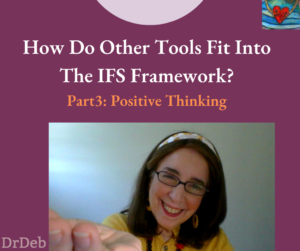Part 3: Positive Thinking
Because if I’ve helped you, great. And if you need more help, then you will know exactly what it is we do and how we do it. And you can decide if you want to work with us.
Please refer to Part 1 to get a bit of the reason why I went in search of the perfect combination of tools to help couples live happy lives; also what Internal Family Systems (IFS) is, and Affirmations.
Now, we’re going to dive into this fascinating question:
How Can We Think Positively When We Don’t – and Why Should We Anyway?
I’d like to address the second question first.
That is because the pessimism protected them against disappointment. If they got too excited about something and it didn’t happen, they would be more unhappy, so the reasoning went, than if they never got their hopes up in the first place.
An unhappy, negative perspective on life has been shown to shorten our DNA strands. How about that? This is serious stuff.
Not only that, a negative world-view is unfortunately passed down the generations; children easily pick up adult vibes and make them their own.
The real question is: If a person did want to change how they see the world, can they?
And the answer is “Absolutely, they can.”
True, it may be emotionally difficult because a person in a bad mood may actually want to stay there; the bad mood is a symbol of the troubles that this person has been through.
All true. Yet, anyone should ask themselves: What is the value of a life lived in misery? Do I want to dwell on the tortures I’ve had or do I want to live my life while I’m alive, to quote Bon Jovi?
How This Integrates With IFS
The bad feelings you have about your life, yourself, your partner, all of it – all comes from just a part of you.
Just a part.
A loud, demanding, suffocating part.
But just a part.
It’s not you. It’s certainly not all of you.
An important part, perhaps, but only that. A part.
1. you will have to listen to your part’s story.
2. you have to value and appreciate what the part did for you all these years.
3. you have to take Self Leadership to have the full and joyous life you want.
These parts are not to be looked at as “wrong” or “bad” or even annoying. They were necessary at the time.
When she was able to separate enough from this Dark Part to listen to it, she learned that she was 14 when it appeared in her life. Her mom was taken by ambulance to the hospital and she never saw her again. Her dad remarried and both he and his new wife favored her kids and the kids they had together over Sandie.
So it made sense to have a dark outlook on life.
But it was the logic of a 14 year old, so from that perspective, it made sense.
Sandie thought about that. By now, she had children of her own. One of them was already married and she was going to become a grandmother! She loved her own children dearly and when she thought some more, she realized – shock of shocks – that she disagreed with her part!
So she asked the Dark Part what was it afraid of it allowed her to be happy?
Very good question.
The part said that it would warn her if she was getting too optimistic.
If this seems too way out, it’s not. It happens every day in therapy with my team and me. We love seeing our clients take Self leadership and come into the sunshine.
While the Dark Part still has a say in things.
To some degree.

